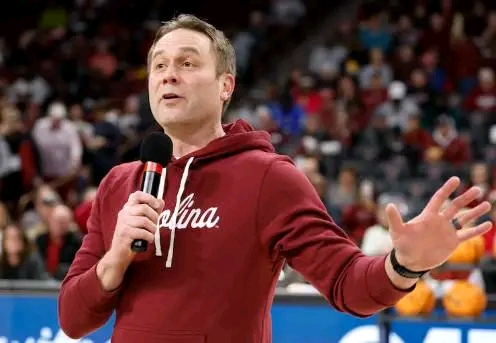
Jeremiah Donati Reveals the “Wild West” of College Sports, Featuring $800K NIL Deals, During South Carolina University Board Meeting

At a recent South Carolina University
Board meeting, Athletics Director
Jeremiah Donati painted a picture of a
college sports landscape characterized by
unprecedented NIL (Name, Image, and
Likeness) deals and jaw-dropping
financial offers. In a candid assessment,
Donati shed light on the rapidly evolving
environment, labeling it the “Wild West”
of college athletics. His statements
sparked a lively discussion about the
implications of these deals on the future
of college sports.
In the past year or so, Name, Image, and
Likeness deals have become mainstream,
allowing student-athletes to capitalize on
their fame and marketability. This shift
has opened the floodgates for lucrative
endorsements, sponsorships, and
business ventures. While the initial
intention behind the NIL policy was to
provide more flexibility for student-
athletes, the rapid escalation of these
deals has led to concerns about fairness,
accountability, and the long-term
implications for colleges and
universities.
At the USC Board meeting, Donati
pointed to a few instances where NIL
deals reached astronomical heights. One
particular instance caught the attention
of observers: a prominent student-
athlete received a staggering $800,000
endorsement deal from a prominent
national brand. These massive payments
are creating both a competitive arms
race and a new standard for what is
considered acceptable within the college
sports realm.
This trend raises concerns about whether these massive deals create an uneven playing field. Smaller schools may struggle to match the financial offers, giving an unfair advantage to programs from larger, more affluent institutions. The current state of affairs is further complicated by the lack of transparency and oversight, making it challenging for governing bodies to monitor and regulate these transactions.
Donati also touched on the issue of student-athlete well-being, highlighting the need for more comprehensive support services for athletes navigating the complex landscape of NIL deals. The financial demands and pressure to perform can take a toll on athletes, and schools must prioritize their mental and emotional health.
In an effort to address these issues, the NCAA is working on implementing new guidelines to standardize NIL deals and provide clearer rules regarding their use. Some proposals aim to create a system where schools can provide a framework for athletes, including resources for education and financial planning.
However, critics argue that these measures do not go far enough in addressing the core problems. With so many schools and entities jumping into the NIL space, there’s a pressing need for a clear, national framework that balances the rights of student-athletes with the interests of their schools and the NCAA.
USC Board members listened intently as Donati shared his observations, recognizing the significance of these developments for the future of South Carolina Athletics. His comments served as a wake-up call, emphasizing the importance of proactive management in this uncharted territory.
As the NCAA continues to grapple with the complexities of NIL deals, college athletics finds itself amidst a transformative period. With the financial stakes higher than ever, it’s imperative for institutions like USC to remain adaptable and committed to providing a supportive environment for student-athletes. The road ahead will be challenging, but as Jeremiah Donati so eloquently put it, the current landscape of college sports is indeed the “Wild West,” full of uncertainty and untold riches.
In the end, the future of college athletics hangs in the balance, and the decisions made in this era will shape the course of the sport for years to come. The conversation initiated by Donati at the USC Board meeting will likely be echoed across the country, fueling discussions about how to navigate this brave new world and ensure that its benefits are shared by all stakeholders.





